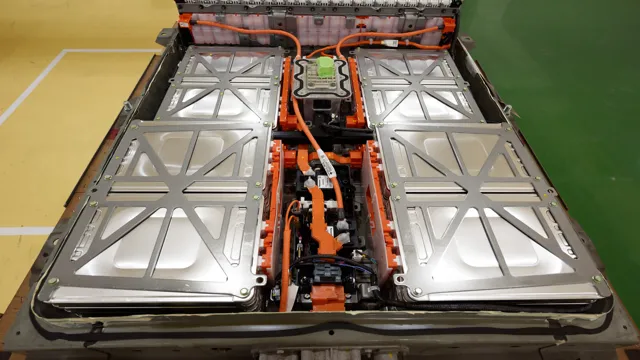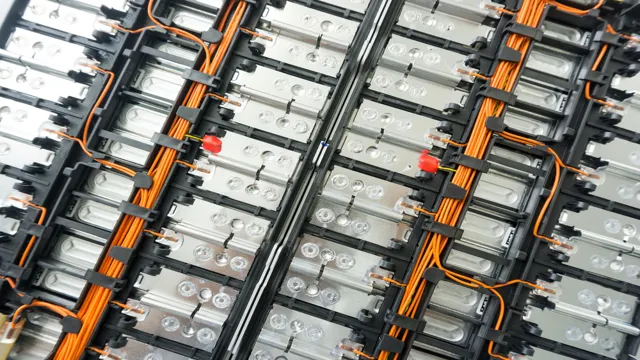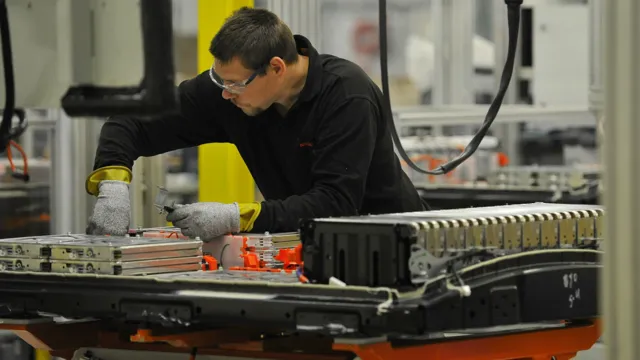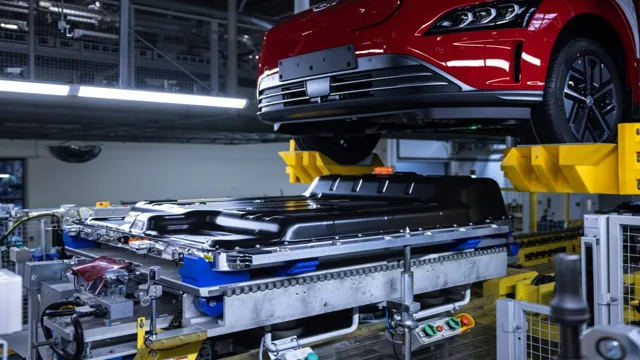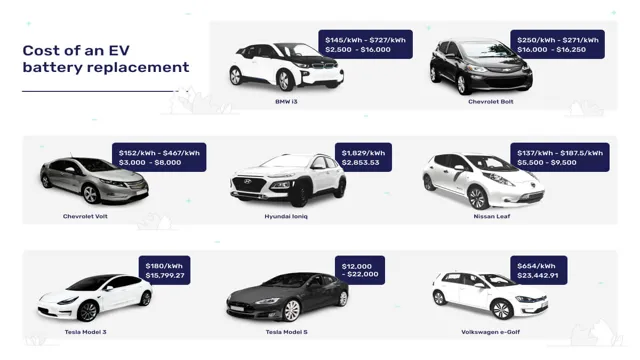Revolutionary Drop in Electric Car Battery Costs: A Game-Changer for Sustainable Transportation
The future of automobiles is here, and it’s electric! The electric car battery revolution has been building up speed for a while, but it’s now gaining a momentum that will revolutionize the way we drive. With the improvement of battery technology, electric cars have become a viable option for many people, especially those who are environmentally conscious. In the past, electric cars were seen as inferior to gasoline-powered vehicles because of their limited range and battery lifespan.
However, with recent advancements in battery technology, electric cars now offer longer ranges and more durability than the older models. This means that people can drive longer distances without worrying about running out of power, and the batteries themselves are capable of lasting much longer. The benefits of electric cars don’t stop at environmental friendliness.
They are also much cheaper to operate than their gas-guzzling counterparts. The cost per mile of an electric car is significantly lower than that of a gas-powered vehicle, making them a more efficient option for daily use. Electric cars are also much quieter than traditional cars, and they produce no emissions, making them ideal for urban environments.
With the growing popularity of electric cars, it’s only a matter of time before they become the norm on our roads. The electric car battery revolution is just getting started, and the future looks bright. As battery technology continues to improve, we can expect even more advancements in the electric car industry.
The possibilities are endless, and the benefits are numerous. It’s time to join the revolution and experience the future of driving!
Current Cost of Electric Car Batteries
The cost of electric car batteries has been steadily decreasing in recent years due to advancements and innovating in battery technology. In fact, the price of a kilowatt-hour (kWh) of battery storage has dropped by a staggering 87 percent since 20 This decrease in cost has made electric cars more affordable for the average consumer and has bolstered the electric vehicle market.
This shift towards more cost-effective batteries was largely driven by the need to make electric vehicles more competitive with traditional gas-powered cars. There is still room for improvement, however, as the cost of electric car batteries is one of the main hurdles remaining for widespread adoption of electric vehicles. With ongoing research and development, and increased production volumes, the cost of electric car batteries is expected to continue to decline in the coming years, making electric vehicles even more accessible and affordable for everyone.
Data on battery costs over time
The cost of electric car batteries has been steadily decreasing over the years. In fact, recent data suggests that electric vehicle batteries will be cost-competitive with combustion engines by 202 As demand for electric vehicles continues to rise, manufacturers are investing heavily in battery technology, resulting in more efficient and cost-effective batteries.
With advancements in technology, such as solid-state batteries, the cost of manufacturing electric vehicle batteries is expected to continue to decline further. It is now possible to buy an electric vehicle with a range of 300 miles or more without breaking the bank. The trend towards cheaper electric vehicle batteries is not just good news for the consumer, but it also bodes well for the environment, as more people will switch to clean, renewable energy sources for their transportation needs.
In conclusion, the current cost of electric car batteries is becoming increasingly competitive with traditional combustion engines, ushering in a new era of sustainable transportation.

Factors affecting battery cost
The current cost of electric car batteries is one of the biggest barriers to widespread adoption of electric vehicles. The factors contributing to the cost include the price of the raw materials used in the batteries, the manufacturing process, and economies of scale. The materials used in batteries, such as lithium and cobalt, have seen significant price increases in recent years, driving up the cost of batteries.
The manufacturing process is also costly, as it requires specialized equipment and skilled workers. However, as the demand for electric vehicles grows, economies of scale are expected to drive down the cost of batteries. Additionally, advancements in technology may help to reduce the materials and manufacturing costs over time.
Despite the current high cost, the benefits of electric vehicles, such as lower emissions and reduced operating costs, make them an attractive option for many consumers.
Recent Battery Innovations
In recent years, there have been significant advancements in electric car battery technology that have contributed to a considerable drop in costs. One of the most promising innovations is the use of solid-state batteries, which offer higher energy density and faster charging times than traditional lithium-ion batteries. Additionally, researchers and manufacturers are exploring the use of alternative materials, such as sodium-ion or zinc-air, to replace costly and rare elements like lithium.
These technologies will not only make electric cars more affordable but also more sustainable. However, it’s important to recognize that battery costs aren’t the only factor hindering the widespread adoption of EVs. Issues like range anxiety, lack of charging infrastructure, and consumer reluctance still need to be addressed.
Nonetheless, the drop in battery costs and constant innovation in the industry offer hope for a cleaner, greener future.
New materials and production techniques
Recent advancements in materials and production techniques have led to some exciting new developments in battery technology. One notable innovation is the use of solid-state electrolytes instead of liquid electrolytes, which could potentially improve both safety and energy density. Another breakthrough is the use of new electrode materials such as silicon or lithium metal, which can significantly increase energy capacity.
Additionally, researchers have been exploring the use of nanotechnology to enhance electrodes, as well as developing more efficient manufacturing processes such as roll-to-roll production. These advancements represent a major step forward in the development of more efficient, reliable, and environmentally friendly batteries. As we move towards a more electrified future, it’s clear that continued investment in research and development is crucial to unlocking the full potential of these exciting technologies.
Impact of innovations on cost
Recent Battery Innovations and their Impact on Cost The recent innovations in batteries have been a game-changer in terms of cost-effectiveness. With the advancements in Lithium-ion batteries, companies have been able to reduce their costs and improve efficiency. These batteries are smaller in size and have a higher energy density, which allows them to store more energy in a smaller space.
In addition, they have a longer lifespan than traditional batteries, which means there is less need for frequent replacements. This results in less wastage, and ultimately, less cost for the companies and customers. Moreover, the production costs of these batteries have decreased significantly, making them affordable for people from all walks of life.
Furthermore, these technological advancements in batteries have revolutionized the renewable energy sector. The ability to store energy from renewable sources has led to an increase in reliance on renewable energy, which is cost-effective and environment-friendly. Overall, the recent battery innovations have not only reduced the cost of batteries, but they have also impacted various industries in a positive way, proving to be a sustainable solution for the future.
Future of electric car batteries
The future of electric car batteries is looking brighter than ever, thanks to recent innovations in the field. One significant development is the use of solid-state batteries, which could potentially replace the traditional lithium-ion batteries that are currently used in most electric cars. Solid-state batteries offer potential advantages such as higher energy density, faster charging times, and improved safety.
Additionally, advancements in battery chemistry and materials are increasing the lifespan of electric car batteries. For example, researchers have created a new lithium-sulfur battery that could offer up to five times the energy density of current lithium-ion batteries. With these innovations, electric cars may soon become even more practical and affordable for the average consumer.
Cost Savings for Consumers
The cost of electric car batteries has been steadily decreasing over the years, allowing more consumers to consider purchasing an electric vehicle. In fact, the electric car battery cost drop has been significant enough to make EVs more affordable than ever before. This is great news for consumers as they can not only save money on fuel costs but can also benefit from reduced maintenance expenses.
Additionally, those who live in areas with a high number of EV charging stations can save even more money by opting for the cheaper charging options. As technology continues to improve and manufacturers increase production, it’s likely that we will see even more significant cost savings for consumers in the future. Overall, the electric car battery cost drop is a positive development that is making it easier and more affordable for the average person to make the switch to electric vehicles.
Effects on electric car prices
As electric cars become more popular and competition among manufacturers heats up, the cost savings for consumers are becoming increasingly apparent. Not only do electric cars have fewer moving parts and require less maintenance, they also have lower fueling costs and may qualify for government incentives. Additionally, as the production of electric car components becomes more efficient, prices for these vehicles are likely to come down.
While electric cars are still more expensive than traditional gasoline-powered cars, many consumers are willing to pay more for the benefits they offer. As adoption rates continue to rise and demand increases, it is likely that electric car prices will continue to fall, making them a more accessible option for all drivers. Overall, the cost savings and long-term benefits of electric cars make them an attractive choice for environmentally conscious consumers.
Projected savings from reduced battery costs
As battery technology continues to evolve, the projected cost savings for consumers are significant. Consumers could see considerable savings in the near future as the cost of battery production is estimated to fall drastically. The declining costs of batteries are due to advances in technology that allow for cheaper raw materials, better manufacturing techniques, and improved battery lifetimes.
As a result, the cost of electric vehicles, home batteries, and other battery-powered devices will become more affordable and accessible. This shift will make it easier for consumers to switch from fossil fuels to clean energy sources and save money in the process. In the long run, these cost savings could help to accelerate the adoption of electric vehicles and other emerging technologies that rely on battery power.
The projected cost savings are exciting news for consumers, as they will help to make clean energy accessible and affordable for everyone.
Investing in the Electric Car Battery Industry
One of the most significant factors driving the growth of the electric vehicle industry is the declining cost of electric car batteries. Over the past decade, we have seen a significant drop in the price of batteries, making electric vehicles more affordable for consumers. As the demand for electric cars continues to grow, the cost of batteries is expected to keep falling.
Investors looking to capitalize on this trend should consider investing in companies that are playing a key role in the electric car battery industry. These companies are working to improve the performance and reduce the cost of batteries, which could help drive the growth of the electric vehicle market even further. As an investor, it is essential to do your research and invest in companies with a proven track record of success in the industry.
While there are risks, investing in the electric car battery industry could pay off in the long run, especially as the world continues to shift towards more sustainable forms of transportation.
Conclusion
In conclusion, the recent drop in electric car battery costs has been a real game-charger for the auto industry. It’s clear that the future of driving is electric, and with more affordable batteries, more drivers can make the switch. So let’s charge up our cars, hit the road, and let the good times (and low costs) roll!”
FAQs
How much has the cost of electric car batteries dropped in recent years?
The cost of electric car batteries has dropped by around 80% since 2010.
What factors have contributed to the decline in electric car battery costs?
The decline in electric car battery costs can be attributed to factors such as improvements in battery technology, economies of scale in production, and increased competition among battery manufacturers.
Are there any government incentives for purchasing electric cars due to the drop in battery costs?
Yes, many countries offer incentives such as tax credits or rebates for purchasing electric cars to encourage the transition from traditional gas-powered vehicles to electric ones.
Will the cost of electric car batteries continue to drop in the future?
It is likely that the cost of electric car batteries will continue to drop as battery technology advances and production processes become more efficient.
